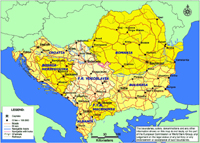Heads central, southeast Europe countries discuss region's development

The presidents will also explore ways to bring the region closer to the European Union. They are meeting against a lack of progress in talks on the future of Kosovo and the upcoming independence referendum in Montenegro.
The summit brings together presidents of six EU nations, six Balkan countries and Ukraine. Of the Balkan nations represented, Bulgaria is scheduled to join the EU in January, Croatia is holding membership talks, while Macedonia, Moldova, Albania and Bosnia have been seeking better ties with the bloc.
Citing the referendum in Montenegro, the Kosovo status negotiations, Bosnia's constitutional reform, as well as the fact that key figures wanted by the Hague Tribunal are still at large, Parvanov said that "democracy in the Western Balkans is exceedingly fragile and its strongest mainstay and protection can only be the clear European prospect of the region."
He noted that the European economy will benefit from the accession of the countries of the region which represent a market of 100 million people.
At a press conference after their meetings, the presidents voiced unanimous support for the ongoing expansion of the European Union to the countries of the western Balkans and further east - to Moldova and Ukraine, the AP reports.
Energy security - an issue highlighted by the recent gas price dispute between Ukraine and Russian gas giant Gazprom - emerged as one of the focuses of the summit's discussions, with Ukraine's Viktor Yushchenko calling for "an energy security coalition."
The presidents also met top businessmen and bankers with interests in the region, including senior executives of German industrial conglomerate Siemens, Italy's electricity giant Enel, Czech power utility CEZ and Deutsche Bank, the AP reports.
Subscribe to Pravda.Ru Telegram channel, Facebook, RSS!


